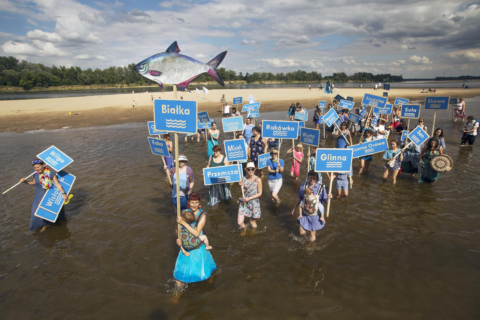Against the backdrop of a shift to the right, war and the climate crisis, there is a growing need for useful art – socially engaged, participatory art, art that intervenes directly and practically. After the IMPULS Festival 2022 described the world from the future with Futur2, the current crises challenge us to act in the here and now. With this year’s motto No Time Like the Present, the festival in cooperation with the GfZK responds to the present and its pressing questions. In a diverse joint programme of concerts, workshops, films, discursive formats and artistic interventions, the focus is on socially engaged and collective art practices that intervene directly in social processes.
Programme
River Sisters – The Battle for Water
15 – 17h, Workshop in English language at HGB Leipzig
17 – 18h, Procession to the river (starting point GfZK) with the Otucha Choir Collective in English language
The River Sisters (Siostry Rzeki) is an artistic-activist collective from Poland that calls on women* to give rivers a voice and join the struggle that is taking place between environmentalists and politicians, civil servants and the hydro-engineering lobby. It is a fight for wildlife, for a landscape and for clean water that is becoming the most precious resource of our planet. In this workshop, participants will gain insights into the artistic-activist practice of the collective and will be invited to join the fight for our environment in a subsequent procession together with the Polish choir collective Otucha from the GfZK through the park along the Elster Riverbed to the Palm Weir.
The Art of Protest – Sound and Activism
15 – 17h, GfZK
Workshop in English
Against the backdrop of a shift to the right, war and the climate crisis, there is a growing demand for socially engaged, participatory art – art that intervenes directly and practically. But what can art do? What possibilities does art open up, what are its limits? What role can sound and music in particular play in the transformation processes of our society? In her participatory workshop format, researcher, curator and activist Hanna Grześkiewicz builds a bridge between art and activism that places sound and collective practice at its centre. Together, different perspectives from theory and practice are shared and sustainable
artistic-activist strategies are developed.
19.30 – 20.30h, GfZK, Black Box
Instrumentalities – Sounding Climate Data
Lecture Performance in English
During a special guided concert entitled Instrumentalities, the Sono-Choreographic Collective will present their artistic-scientific methods for listening, sensing and understanding climate change, including sonic and somatic techniques that connect planetary scale with the individual and collective sensory scales of participants.
21.15 – 22.15h, GfZK, Black Box
Film: Foragers (Jumana Manna)
in English
Foragers depicts the dramas around the practice of foraging for wild edible plants in Palestine/Israel with wry humor and a meditative pace. Following the plants from the wild to the kitchen, from the chases between the foragers and the nature patrol, to courtroom defenses, Foragers captures the joy and knowledge embodied in these traditions alongside their resilience to the prohibitive law. By reframing the terms and constraints of preservation, the film raises questions around the politics of extinction, namely who determines what is made extinct and what gets to live on.
